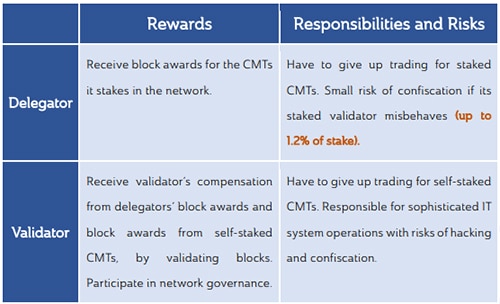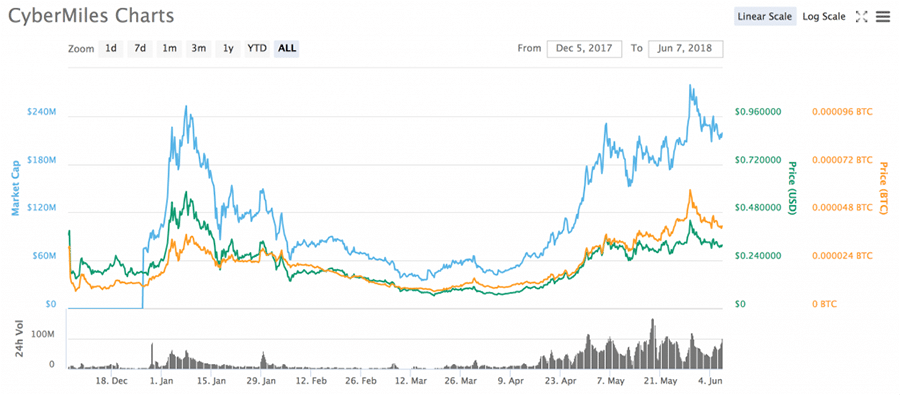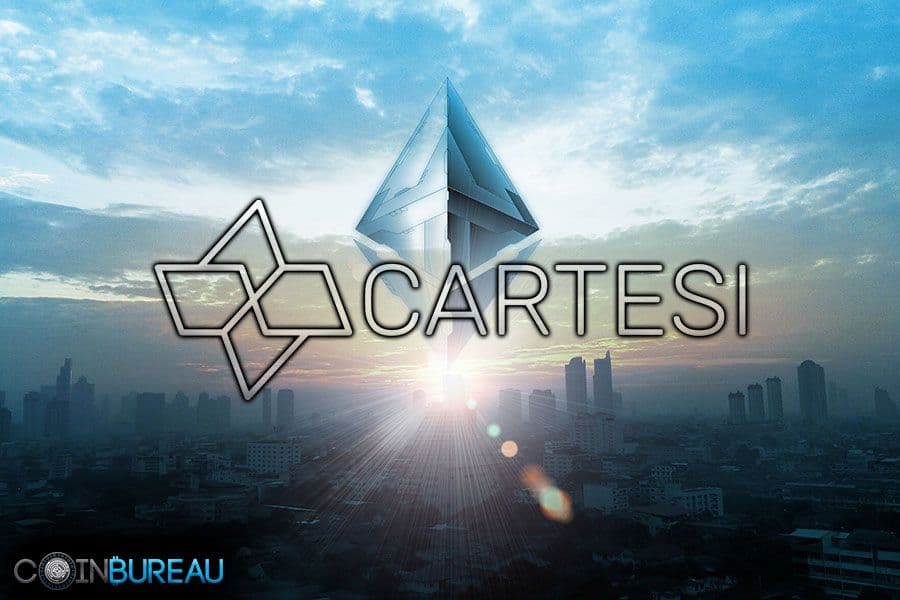CyberMiles is looking to become the first blockchain company to conquer a piece of the $400 billion US e-commerce market.
The platform is building a smart contract template for e-commerce companies to launch their businesses on the blockchain.
Developed under 5miles, a leading e-commerce company in the US, CyberMiles aims to challenge online shopping giants like Amazon with a more decentralized and equitable alternative.
Current Landscape
in 2017, Amazon held a 43.5% share of the US e-commerce market, with eBay coming a distant second at 6.8%. Today tech company has become as synonymous with e-commerce as Google is with search.

Rankings for E-commerce Sites. Source WhitePaper
However, Amazon's market dominance has caused many to categorize the company as a monopoly. Monopolies stifle innovation, while creating complacency amongst market leaders.
This results in poor customer service being given to those who have fewer options to turn to. Furthermore, centralized e-commerce platforms are more vulnerable to hacks, and also take large cuts of every sale made on the platform.
5miles sees an opportunity to disrupt Amazon's dominance by creating a decentralized, peer-to-peer marketplace where e-commerce businesses can operate on a much more even playing field.
Technology
CyberMiles is not only providing a superior e-commerce platform, they are also developing a superior blockchain specifically for e-commerce applications.
CMT Token
CMT is the main token used in the network. Like Bitcoin and Ethereum, the token is paid to those who support the network by validating transactions. In order to earn CMTs, network participants need to:
- Validate purchases, loans, payments, credit history and other transactions on the network (all info is anonymous, secure, and encrypted on the blockchain)
- Validate and execute Smart Business Contracts on the network (these contracts are software applications that automatically determine who should pay who at what time).
E-commerce businesses can use CyberMiles smart contract infrastructure to launch their own unique tokens within their platform (this is similar to Ethereum’s ERC-20 tokens).
Custom tokens created by e-commerce sites who connect to the blockchain can be used to purchase goods or for loyalty points programs.
PoS Consensus Mechanism

CyberMiles dPoS Governance via CyberMiles
CyberMiles uses the delegated proof of stake (or dPoS) consensus mechanism (similar to the EOS Blockchain).
In a proof of stake consensus mechanism, users ‘stake’ a certain amount of CMT as collateral in exchange for the ability to validate transactions in a new block of the CyberMiles blockchain.
Also with delegated proof of stake, the network nominates multiple “witness nodes” as representatives who help make certain high-level decisions more quickly without polling the entire network.
Although this method is slightly more centralized, it has been proven to provide Blockchains like EOS with 50,000 transactions per second in test mode.
Library of Smart Contracts
Building an e-commerce platform on the blockchain requires creating different smart contracts for peer-to-peer, peer-to-system, and system-to-system interactions. CyberMiles solves this problem by creating a library of smart contracts that will facilitate the entire back and front-end functionality of their e-commerce network.
Peer-to-peer smart contracts will allow users to make transactions, settle claims, and dispute or return orders.
‘Middleware’ smart contracts will enable operating systems, databases, and applications located inside and outside of the Blockchain to communicate with each other autonomously.
The last piece of the puzzle is the CyberMiles virtual machine. Like the Ethereum’s virtual machine, this technology provides a testing environment for the various operations being conducted by CyberMiles library of smart contracts.
The virtual machine remains isolated from the main blockchain, overseeing the system to make sure peer-to-peer and middleware smart contracts are being executed accordingly.
CyberMiles aims to utilize these technologies to create a more efficient and cheaper e-commerce platform.
Team
CyberMiles brings together a highly experienced and intelligent team, most of whom also work for 5miles:

Cybermiles Team. Source: cybermiles.io
Founder and CEO – Lucas Lu, PHD
Dr. Lucas founded 5miles in 2014. He received his PHD degree in Particle Physics from SMU in 2005. He worked at CERN where he participated in research of the Higgs Particle. Lucas was previously a co-founder and CTO of Light In the Box, a company that went public on the NYSE, and prior to that, Lucas was the first GM of Alibaba’s Taobao Mobile platform.
Chief Scientist - Michael Yuan, PhD
Michael received a PhD in Astrophysics from University of Texas. He is the author of 5 books on software development. Michael was an active code committer in large Open Source projects such as Firefox, Fedora, JBoss, and others. He is an expert on enterprise and mobile software and was a Principal Investigator on multiple research projects funded by the US government.
CTO – Robert Lee
Robert Li is currently CTO of 5miles and CyberMiles. Prior to working at 5miles, he was a lead engineer at eBay and senior R&D manager at Google in Shanghai.
Core Developer – Timothy McCallum
Timothy McCallum specializes in Fintech programming, as well as blockchain implementations for businesses. His most recent project was a finance data migration exercise for local government.
Roadmap
5miles was founded in April 2014.
3 years later, with 11 million users and a valuation of $300million, the team decided to launch 5xlab, which would focus on developing CyberMiles. In November 2017, the company raised $30 million in their ICO.
In June, 5miles app plans to begin accepting CMT to facilitate marketplace transactions.
By December 2018, they plan to launch version 1 of the CyberMiles’ platform, and by March 2019, they aim to have CyberMile modules available for use on other platforms to facilitate further adoption.
Token Performance
On December 5th, the company's token hit exchanges at a price of $0.36. Within a month the price shot up to $0.58 as the crypto market hit all-time highs. Through the first half of this year, CMT token fell below its launch price, dropping to $0.06 in March, before climbing back up to its current price of $0.31.

CMT Token Performance. Source: CoinMarketCap
CyberMiles (CMT) are ERC20 tokens that can be found on the Binance exchange, Huobi, OKEx, and IDEX. CyberMiles plans to move away from Ethereum and establish their own token standard once their Mainnet launches.
Strengths
CyberMiles is a really interesting project that has a strong backing behind it and an effective use case. Below are some of the advantages:
- 5 miles is already an established player in the online e-commerce space, with 12 million users and $3billion in annual revenue. If CyberMiles can capture just 5% of that value from 5miles’s business, it will generate huge returns for its CMT tokens.
- CyberMiles is focusing on scalability by working with the delegated proof of stake consensus protocol. This means the network should at a minimum be able to validate more transactions per second than Bitcoin and Ethereum can currently.
- CyberMiles is going after a very large market; US e-commerce is expected to be valued at $630Billion by 2022. As Blockchain technology evolves, a large part of that value is likely to come from decentralized peer-to-peer applications.
- The team is highly experienced, trained academically and diversified in their skills – primarily finance, blockchain and e-commerce
- Blockchains are more resistant to network failure; meaning users are unlikely to experience downtime when online shopping through e-commerce apps linked to CyberMiles blockchain.
Weaknesses
With the being said, there are at least two weaknesses that we can see with the project. These, ironically, are as a result of the immutable and decentralised nature of blockchains:
- Smart contracts are immutable and transactions cannot be reversed. This could create all sorts of problems as people naturally make mistakes when purchasing items online (like purchasing items in the wrong size, or inputting the wrong delivery address). On a centralized platform, such mistakes would be reversible, but that is not the case on a decentralized Blockchain.
- Customer support issues (like refunds) will not be handled by any central authority, but instead decided by voting consensus. This could become inefficient and lead to a backlog of complaints, as each case needs multiple parties involved to make a decision.
Conclusion
CyberMiles is attempting to establish dominance in the blockchain e-commerce space.
With Amazon claiming almost 50% of the general e-commerce market share, the blockchain seems like the only space in which they can be contested.
The CyberMiles Blockchain is ambitious and will likely accrue incredible value if successful. However, they will face many challenges when it comes to managing smart contracts, solving customer disputes and ensuring transactions can be fast enough to meet demand.
Overall we definitely think this is a project to keep a close eye on.
If CyberMile can overcome the limitations of today's smart contract technology, while tapping into 5miles $3billion annual revenue stream, then it could very well become the biggest player in the blockchain e-commerce market.
Featured Image via Cybermiles & Fotolia



